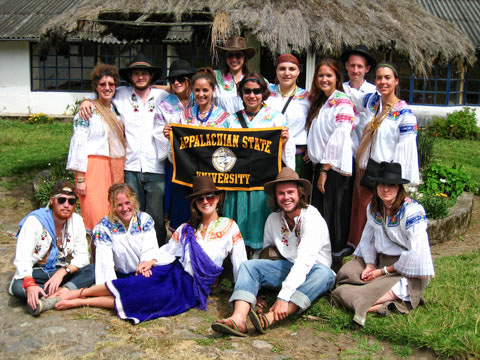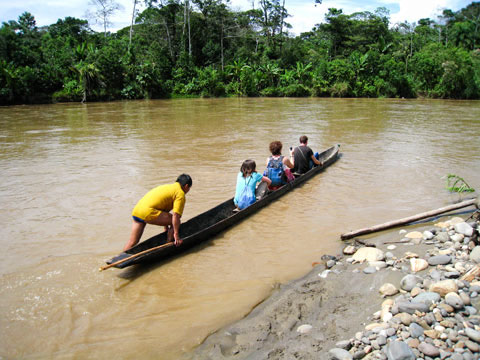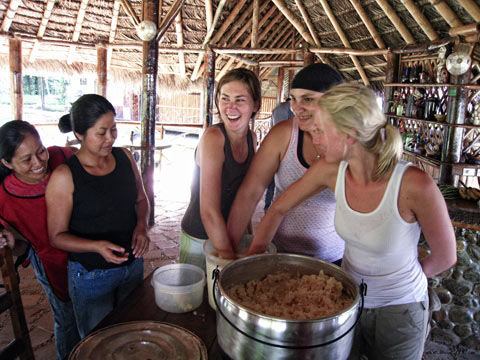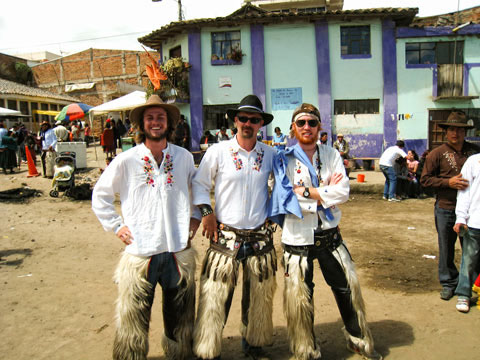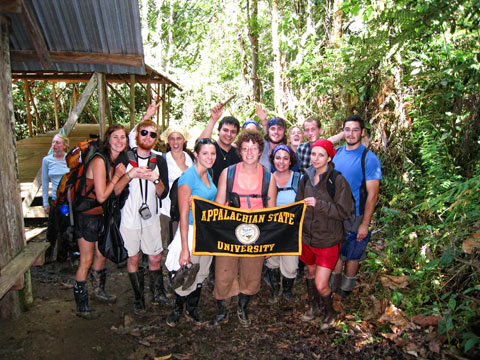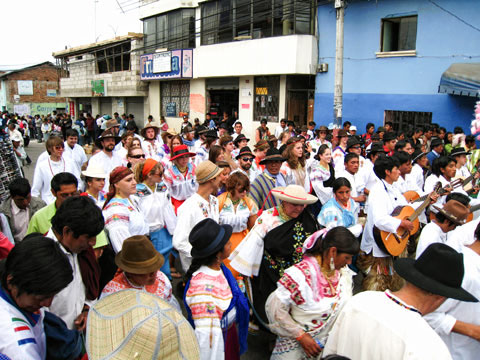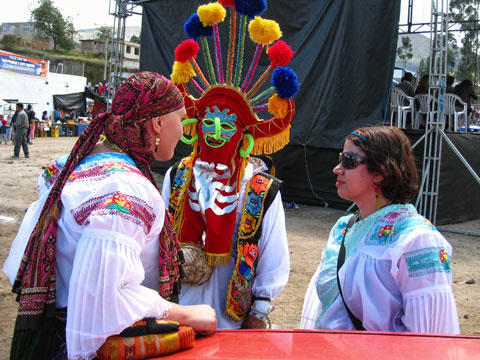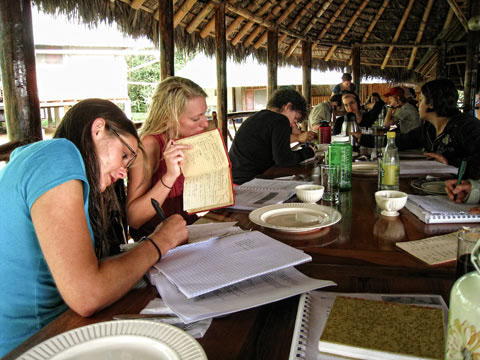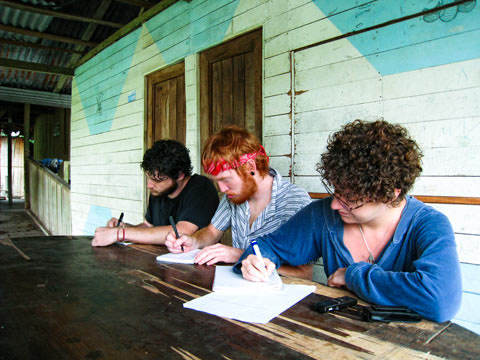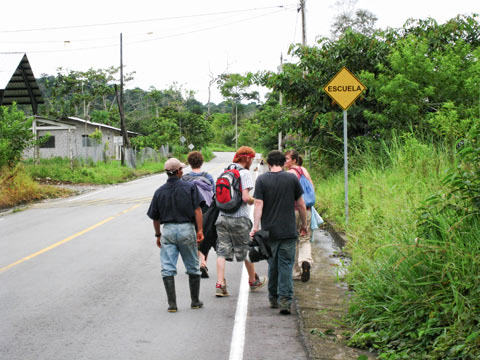This past summer, 16 students from Appalachian State University traveled to Ecuador to study indigenous activism and language in the Upper Amazon for three weeks. They came away with a greater appreciation of the impact of oil in the Amazon and its affect on the lives of the indigenous people.
The field site was in the Napo Province of eastern Ecuador. The students lived on the grounds of a local indigenous foundation of the Amazon which focuses upon eco-tourism and conservation of the rain forest.
As part of an ethnographic study led by Dr. Timothy Smith, assistant professor in the Department of Anthropology, students learned how to construct research projects and develop interviewing techniques to examine the impact of oil, local history, identity/activism and gender to better understand the Kichwa culture. The trip was organized through a faculty-led Appalachian Overseas Program.
The focus of the study was on indigenous activism in Ecuador surrounding the introduction and maintenance of an oil pipeline, as nearly 40 percent of Ecuador’s export earnings derive from the oil industry.
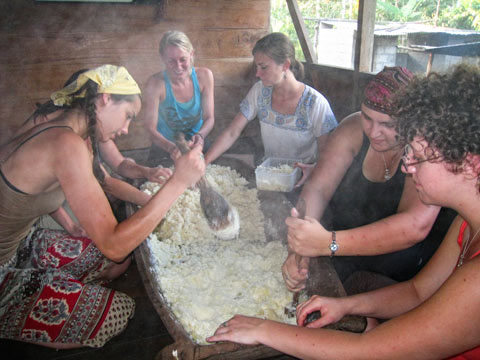
Students use a traditional canoe-like vessel and mallets to mash manioc, one of Ecuador’s staple crops, before extracting the fibers, adding sweet potato juice and storing the mixture. Students made aswa, also known as “chicha,” which is a fermented beverage offered as a sign of hospitality in the Andes.
The group became concerned with how the oil industry impacted the Kichwa people because they are “beautiful people, they live off the land, they have a really beautiful history and language,” said Charles Webster, a senior double major in Spanish and Latin American studies, “and no matter what group you were a part of, the subject of oil always came up.”
Their experiences from interacting with the Kichwa people gave the students a desire to educate the Boone community about their trip and the impact of oil on the Kichwa culture.
The students were also immersed in the Kichwa language, the dominant indigenous language spoken throughout the Andean and Amazonian areas of South America, and underwent intensive Kichwa study in the afternoons.
“I would not have expected that I could learn so much about a culture and its language as I did on this trip. It was only until I asked an indigenous man when the bus was coming in his own language that I realized how much I had learned,” explained Webster. “It’s sad to see that the Spanish language is taking over. Most of the youth reject the Kichwa language because they see it only as a language their grandparents speak.”
It’s important for students to study the language because, “You have to understand the language to understand the culture,” said Webster. “It shows that you care enough and it served as an icebreaker.”
Abigail Semon, a senior double major in Spanish and global studies, said, “Learning the language teaches the importance of communicating with people in their own terms.”
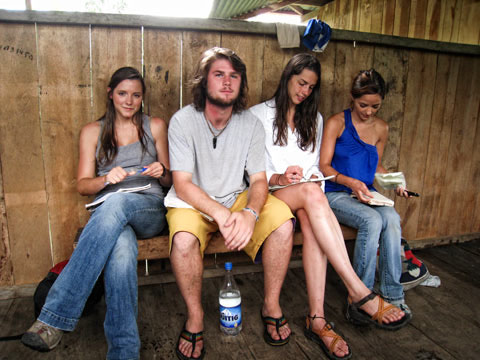
Students attend the Inti Raymi (Festival of the Sun), which marks the Winter solstice. They were invited to participate in the festival as invited guests with a local community near Cayambe.One of the research group’s teams. Each student was assigned a role: recorder, scribe, translator, or interviewer.
In addition to classroom and field instruction, students participated in local traditions such as the celebration of the Inti Raymi festival to mark the Winter solstice. They also joined in a daylong competitive parade of singing and dancing in the town of Cayambe.
“The experience I had in Ecuador was like finally coming home to my field of study — to see how anthropologists conduct their methods of data collection made sense of my last two years of classes at Appalachian. Without having this opportunity, I don’t think I would have the idea I now have of my future career,” said Elizabeth Stabler, a senior anthropology major.
Semon encourages other students to study abroad. “It not only gives a global perspective, but also gives courage, strength as an individual, teaches you to cooperate in group situations and how to appreciate others’ talents,” she said. “It’s valuable because we live in an age of globalization and need a deeper understanding of how our lives affect others and their lives. It gives students a new level of consciousness.”
Additional students can take part in this experience as the trip will be offered again in the summer of 2010.
What do you think?
Share your feedback on this story.
About the Department of Anthropology
The Department of Anthropology offers a comparative and holistic approach to the study of the human experience. The anthropological perspective provides a broad understanding of the origins as well as the meaning of physical and cultural diversity in the world — past, present and future. Learn more at https://anthro.appstate.edu.
About the College of Arts and Sciences
The College of Arts and Sciences (CAS) at Appalachian State University is home to 17 academic departments, two centers and one residential college. These units span the humanities and the social, mathematical and natural sciences. CAS aims to develop a distinctive identity built upon our university's strengths, traditions and locations. The college’s values lie not only in service to the university and local community, but through inspiring, training, educating and sustaining the development of its students as global citizens. More than 6,800 student majors are enrolled in the college. As the college is also largely responsible for implementing App State’s general education curriculum, it is heavily involved in the education of all students at the university, including those pursuing majors in other colleges. Learn more at https://cas.appstate.edu.
About the Office of International Programs
Appalachian State University combines a strong liberal arts foundation with a comprehensive, pervasive and integrated commitment to global engagement. The Office of International Programs assists App State in fulfilling its global engagement mission by working to develop awareness, knowledge, appreciation and respect of cultural differences — in both domestic and international contexts — in the university’s students, faculty and staff, as well as in the surrounding communities. Learn more at https://international.appstate.edu.
About Appalachian State University
As a premier public institution, Appalachian State University prepares students to lead purposeful lives. App State is one of 17 campuses in the University of North Carolina System, with a national reputation for innovative teaching and opening access to a high-quality, cost-effective education. The university enrolls more than 21,000 students, has a low student-to-faculty ratio and offers more than 150 undergraduate and 80 graduate majors at its Boone and Hickory campuses and through App State Online. Learn more at https://www.appstate.edu.
